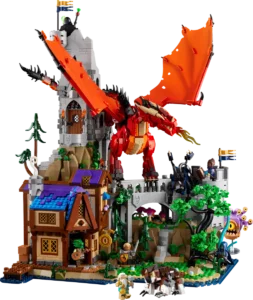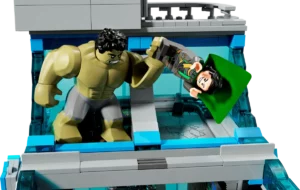?his is extermination!?/i>
Just this once I won? beat about the bush. I?l get straight to the point. Go and see WAR OF THE WORLDS. Go and see it right away. Drop everything – stop reading this review – and go and see this film immediately. I can guarantee you one of the finest cinematic experiences of your lifetime and you won? regret a moment of it. Go and see it now. Straight away. Go on, what? keeping you??
But I?l admit I was a bit concerned about this one. WAR OF THE WORLDS, eh? But haven? we seen all that recently in the gung-ho INDEPENDENCE DAY and Tim Burton? criminally-underrated MARS ATTACKS! Do we need to see Earth levelled again and its population reduced to dust, enjoyable as it always is? Spielberg had his doubts too, and this long-gestating project was put on the back-burner as others destroyed the Earth. But you can? keep a good story down – even one as familiar as WAR OF THE WORLDS. Rewriting the original text to relocate the story in contemporary America rather than Wells? Victorian England seemed a bit of a cop-out too (although ultimately an inspired and inevitable decision) and even the involvement of Spielberg left me feeling uncomfortable. Spielberg can really deliver the goods on occasion – think DUEL, JAWS, JURASSIC PARK, MINORITY REPORT. But let? not forget the mawkish, cloying stinkers – the appalling AI, the irritating THE TERMINAL. Spielberg? at his best when he? being brutal – he just isn? brutal often enough,. My god, he? brutal here and he delivers not only the finest film of his career but what ought to be recognised not only as an important film in its genre but also an important piece of film-making in itself. WAR OF THE WORLDS is a textbook example in how to do a Summer blockbuster with brains as well as brawn – and it leaves contemporaries like the flashy but vacuous latest STAR WARS movie looking like the soulless comic book it is.
Meet Ray Ferrier (Cruise), one of life? losers. He works at the New York docks and lives in a ramshackle house in a less salubrious part of town. He? divorced and enjoys an awkward relationship with his kids, nervy Rachel (Fanning) and surly Robbie (Chetwin). Cruise delivers another charismatic performance but, let? face it, he? far too buff and shiny-toothed to convince as a lazy slob who? never heard of humous. This doesn? matter though when New York is suddenly hit by a ferocious lightning storm. In its aftermath, with all power supplies down and cars rendered useless, the ground starts to tear itself asunder. Something huge and monstrous and metallic rises from the earth and slaughters people – literally vaporising organic matter, leaving their clothing flapping and flailing wildly – with its deadly weaponry. These initial scenes of carnage are disturbing and frankly terrifying, the seamless effects integrated so beautifully into the live action that it? easy to forget we?e watching special effects. And the effects in this movie are special because they?e used quite sparingly but to great effect. It? as if Spielberg has watched bloated, empty monstrosities like VAN HELSING and set out to scare his audiences in subtler ways, using his effects palette as a plaything instead of being a slave to it. Stephen Sommers, take note.
This movie, in many ways more of a remake of the 1953 George Pal version than an adaptation of the original book, works so well because of its perspective. It’s an invasion Earth story but it’s really so much more. It’s about Ray and his battle to save his kids, it’s about his battle to prove he’s a good father just by keeping his family alive in the most incomprehensible of circumstances. It’s about the human condition too – the natural instinct to survive motoring Ray through the devastation and yet reducing the rest of the human population into desperate refugees who, in one startlingly-tense sequence, will stop at nothing to take control of Ray’s car. The only other human survivor we get to spend much time with and who isn’t just death ray-fodder, the half-drunken gun-crazy Ogilvie (Robbins) is broadly depicted as a lunatic with paedophile tendencies and his subtle exit from the narrative reminds the audience just how strong a character Ray has become. In films like INDEPENDENCE DAY it’s easy to become irritated by the relentless Americanism of everything; occasionally someone might mutter about London having been destroyed but American audiences don’t give a damn about that so we rarely get to see any international devastation – the audience is too busy cheering and whooping when the White House gets blasted or the all-American GI boy saves the day. Here, though, the invasion is seen through the eyes of Ray and his family – and if we don’t see it, neither do they. We see the Army roll into action to combat the aliens in their tripods over the brow of a hill and while they are blenty of bangs and flashes, we never cross that brow to see the battle scenes. we don’t need to. We know it’s going on and that’s enough; we’ve become more interested in Ray’s story and we’d really rather see what happens to him and the kids. Ray is no super-hero; he doesn’t have all the answers, he’s as terrified and helpless as anyone else. That’s so refreshing in a big budget Hollywood blockbuster starring an A list acor.
That’s not to say that WAR OF THE WORLDS isn’t visual. Spielberg knows how to frame a dramatic shot and this film is full of them. Shot with a similar dreary colourlessness as MINORITY REPORT, the movie bulges with memorable moments. The sequence where Ray returns home covered in dust, just after the first tripod attack, and wordlessly realises it isn’t building debris covering him, is chilling in its understatedness. Equally haunting is the scene where a burning train rushes past a tide of refugees and the scene where Ray and the kids flee through the woods as clothes – the only remains of vapourised humans – rain down around them is as beautiful as it is horrifying. The tripods themselves are elegant and awesome, giant ullulating monstrosities clanking across the landscape annihilating everything and everyone in their path; another outstanding moment sees Ray and the kids standing on a hillside as tripods chase and wipe out the sea of fleeing survivors in front of them. But there’s no better sequence in this orgy of magnificence than the long, dialogue-free scene in Ogilvie’s cellar when a tripod eye-stalk probes the cellar in search of human survivors and Ray has to use all his ingenuity to elude discovery.
The end, when it comes, is quick and maybe just a little anti-climactic – but that’s more the fault of the book than the movie. The tripods grind to a halt and collapse under the onslaught of the attack from Earth bacteria to which they have no resistance. The biggest disappointment in the movie is the cop-out ending which totally undermines a brave dramatic decision taken during the hillside battle early on and really makes you wish Spielberg had the courage of his convictions but sometimes he just can’t resist the allure of the ultimate happy ending. Also slightly dubious from the point of view of the story is the idea that the tripod machines have been buried under the surface of the Earth for generations, waiting for their pilots to arrive – the aliens apparently transported across space through the lightning bolts. Hmmm, not sure about that one, Steven… But they’re tiny niggling criticisms and the barely takes the edge off this wonderful, beautiful, edge-of-the-seat SF movie. Now what are you sitting there for? Get down to your local multiplex and see WAR OF THE WORLDS…you’ll not gegt a better ride at the cinema this yeat.
]]>



